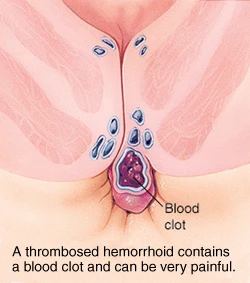
Hemorrhoids are swollen veins in the lower rectum and anus. They’re similar to varicose veins that form in the legs. Hemorrhoids can occur inside the rectum (internal hemorrhoids). Or one may form at the anal opening (external hemorrhoids). Although they may bleed, most hemorrhoids aren’t cause for concern. But a small blood clot (thrombus) can develop in an external hemorrhoid. This may lead to severe pain and sometimes bleeding.
When to Go to the Emergency Room (ER)
If you have severe pain or excessive bleeding, seek immediate medical care.
What to Expect in the ER
A doctor is likely to check your anus and rectum using a slender, lighted tube (anoscope or proctoscope). A local anesthetic is given to ease any discomfort.
Treatment
- If the blood clot has formed within the past 48 to 72 hours, your doctor may remove it from within the hemorrhoid. This is a simple procedure that can relieve pain. You will have a local anesthetic to keep you pain-free during the procedure. A small incision is made in the skin, and the blood clot is removed. Stitches are generally not needed.
- If more than 72 hours have passed, your doctor will suggest home treatments. Simple home treatments can relieve your pain. These may include warm baths, ointments, suppositories, and witch hazel compresses. Many thrombosed hemorrhoids go away on their own in a few weeks.
- If you have persistent bleeding or painful hemorrhoids, talk to your doctor about possible treatment with banding, ligation, or removal (hemorrhoidectomy).
Tips for Preventing Hemorrhoids
- Eat foods that are high in fiber and use fiber supplements to help prevent constipation.
- Drink plenty of liquids.
- Get regular exercise to help prevent constipation and promote good bowel function.
